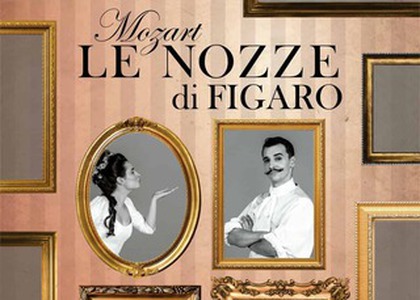> Events

Performance of The Marriage of Figaro at the Sibiu Opera Festival
At the invitation of the Sibiu Philharmonic, I attended, on the evening of October 8th, 2024, one of the performances listed in the schedule of the local Opera Festival. A large-scale event, held between September 27th and October 12th, which featured many of the country's Operas. The festival, now in its 23rd edition in 2024, offered the public performances produced by the Romanian National Opera Iași, the "Nae Leonard" National Theater of Opera and Operetta Galați, the Bucharest National Opera, the Romanian National Opera Cluj-Napoca, and the "Oleg Danovski" National Theater of Opera and Ballet Constanța. Additionally, a special opera night was organized by the hosts, the Sibiu State Philharmonic Orchestra, in collaboration with soloists and the choir of the Brașov Opera. Furthermore, the event also included masterclasses, led by soprano Elena Moșuc (who also held a sacred music concert, accompanied by organist Eduard Antal) and mezzo-soprano Ruxandra Donose, as well as a conference moderated by Claudia Robu, the artistic director of the festival.
I watched the performance of Mozart's opera The Marriage of Figaro, produced by the Romanian National Opera of Cluj-Napoca. Since there is no opera house in Sibiu, the festival's events take place alternately in the Thalia Hall of the Philharmonic and at the "Ion Besoiu" Cultural Center, two beautiful venues that, fortunately, have orchestra pits. The performance of The Marriage of Figaro took place in the "Besoiu" hall, which, however, is not an ideal location acoustically for musical events, as the plush on the seats and walls absorbs the sound. But the soloists adapted very well to the conditions. One of them, baritone Mihai Damian, who played the role of the Count, told me after the show: "Healthy singing is based on internal sensations, not on the hall's feedback, so if we think and sing with the voice through sensations, then we have no problem." Mihai Damian was, in fact, one of the singers I admired most in this production; a recent confirmation of his vocal qualities came from the jury of the Eva Marton competition, held in Budapest, where Mihai won second prize. His stage partners were also remarkable. I especially enjoyed listening to soprano Anna Stănescu in the role of Susanna, a part she debuted in last year in Cluj, which she performs with precision, finesse, and stylistic accuracy, both vocally and in her stage presence.
The "Besoiu" hall was packed, and the audience was fairly disciplined, but rather reserved during the first few minutes of the performance, becoming more receptive towards the end. How did soprano Anna Stănescu feel about the connection with the audience? - "They were a bit timid at first. Initially, I found it strange that after certain moments when we were used to receiving applause, they didn't clap. Probably because they weren't exactly sure if it was appropriate to applaud or not. But then, starting with the third act, they became much more open and received the information from us much better. And by the end, I even noticed many smiles on their faces, which made me very happy. After all, that is our goal: to bring joy to people, for them to enjoy what we convey."
Mihai Damian and Anna Stănescu impressed me greatly, but the entire cast was valuable, featuring young, beautiful, and well-trained voices. I would also like to mention soprano Gebe-Fugi Renata, who brought a great deal of sensitivity to the role of the Countess. I wasn't displeased with bass-baritone Zoltan Molnar either, who performed Figaro's part with good and appropriate intentions, though temperamentally, I don't find him the most suited for the role. Cherubino, a pants role, was sung with slight hesitations by mezzo-soprano Cristina Tureanu; of course, we could say that since Cherubino himself is hesitant, experiencing the first thrills of love, the vocal interpretation was fitting... The cast was completed by Corneliu Huțanu as Bartolo, Alexandra Leșiu as Marcellina, Nicolae Ilincăi as Basilio, and Ionuț Lupu in the small role of Antonio. Overall, the soloists sang very well and with care, with some of them even shining, as I mentioned earlier. The Orchestra and Choir of the Romanian National Opera of Cluj-Napoca also performed very well, and the show was conducted by one of the most experienced opera conductors - David Crescenzi. I appreciated the precision of his tempos and his good communication with the soloists, who were well supported by the orchestra.
Translated by Ramona Ana-Maria Ionescu,
University of Bucharest, Faculty of Foreign Languages and Literatures, MTTLC, year II
Corrected by Silvia Petrescu














